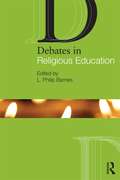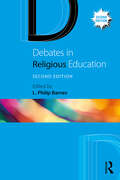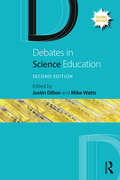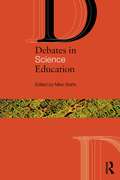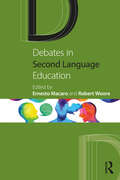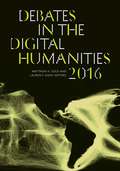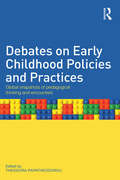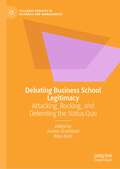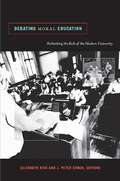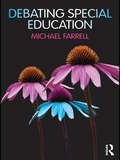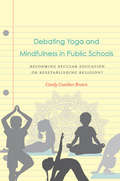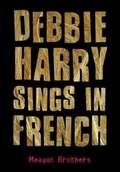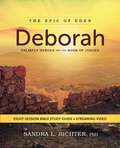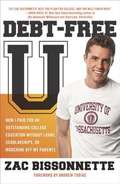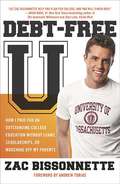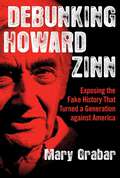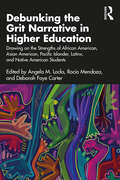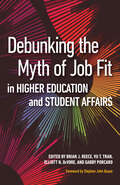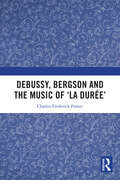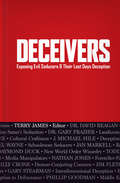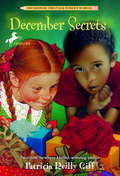- Table View
- List View
Debates in Religious Education: Educating For Diversity (Debates in Subject Teaching)
by L. Philip BarnesWhat are the key debates in Religious Education teaching today? Debates in Religious Education explores the major issues all RE teachers encounter in their daily professional lives. It encourages critical reflection and aims to stimulate both novice and experienced teachers to think more deeply about their practice, and link research and evidence to what they have observed in schools. This accessible book tackles established and contemporary issues enabling you to reach informed judgements and argue your point of view with deeper theoretical knowledge and understanding. Taking account of recent controversy, and challenging assumptions about the place of religion in education, expert contributors cover key topics such as: Effective pedagogy in RE teaching Exploring thinking skills and truth claims The relationship of science and religion in the classroom The place of school worship in contemporary society The role of RE in spiritual and moral development Diversity in the RE classroom. With its combination of expert opinion and fresh insight, Debates in Religious Education is the ideal companion for any student or practising teacher engaged in initial training, continuing professional development and Masters level study.
Debates in Religious Education: Educating For Diversity (Debates in Subject Teaching)
by L. Philip BarnesThis essential book provides a comprehensive introduction to current debates in religious education. Exploring the rich variety of opinions and ideas that constitute and impact upon religious education, both novice and experienced teachers will benefit from deepening their theoretical knowledge and understanding through reading Debates in Religious Education. This second edition has fully updated all chapters and included an additional thirteen new contributions, providing a provocative yet informative introduction to current debates and allowing teachers to reach informed decisions about how they approach this subject. Responding to recent controversy and challenging assumptions about the place of religion in education, expert contributors cover key topics such as: The aims of religious education Religious education in the United Kingdom and Ireland Agreed syllabuses and the role of Standing Advisory Councils Educational issues, such as the right of withdrawal, collective worship, and faith schools Teaching and learning in religious education Multi-faith religious education Relating science and religion. With its combination of expert opinion and fresh insight, this essential text is the ideal companion for any student or practising teacher engaged in initial training, continuing professional development or Master's-level study.
Debates in Science Education (Debates in Subject Teaching)
by Justin Dillon Mike WattsThis fully revised second edition of Debates in Science Education explores the major issues that science teachers encounter in teaching their subject, encouraging the reader to make their own informed judgements and argue their point of view with deeper theoretical knowledge and understanding. Brand new chapters written by a team of international experts provide fresh insight into topics of central importance when teaching science. Written to aid and inspire beginning teachers, current teachers and established subject leaders, these focused chapters are essential to anyone wishing to deepen their understanding of salient issues within school science education, including: STEAM education; sustainability and climate change; science and sensitive issues; equity and diversity; science and sex education; science and religion; science and pedagogy (including science inquiry); transition from primary to secondary school. Encouraging critical reflection and aiming to stimulate both novice and experienced teachers, this book is a valuable resource for any student or practicing teacher and particularly those engaged in continuing professional development or Master’s level study.
Debates in Science Education (Debates in Subject Teaching)
by Mike WattsWhat are the key debates in science teaching and learning today? Debates in Science Education explores the major issues all science teachers encounter in their daily professional lives. It encourages critical reflection and aims to stimulate both novice and experienced teachers to think more deeply about their practice, and link research and evidence to what they have observed in schools. Written by expert science educators, chapters tackle established and contemporary issues enabling you to reach informed judgements and argue your point of view with deeper theoretical knowledge and understanding. Each chapter is supported and extended by carefully selected further reading and reflective questions. Key debates include: the impact of policy on science education; transition from primary to secondary school; getting right the secondary science curriculum; girls in science; sex education and science; school science and technology; language and communication in the classroom; world science, local science. With its combination of expert opinion and fresh insight, Debates in Science Education is the ideal companion for any student or practising teacher engaged in initial training, continuing professional development and Masters level study.
Debates in Second Language Education (Debates in Subject Teaching)
by Ernesto Macaro Robert WooreDebates in Second Language Education provides an up-to-date account of the key debates and areas of controversy in the field of second language learning and teaching. Adopting a broad and comparative perspective and emphasising the importance of considering a variety of learning contexts, it encourages students and practising teachers to engage with contemporary issues and developments in learning and teaching. Chapters are designed to stimulate thinking and understanding in relation to theory and practice, and help language educators to make informed judgements by arguing from a position based on theoretical knowledge and understanding. Bringing together leading contributors in the field, the book discusses a wide range of issues relating to second language learning and teaching including: the relationship between age and success in language learning aptitude versus motivation as predictors of successful language learning linguistic diversity and plurilingualism the teaching of grammar and vocabulary the value of phonics learning pronunciation the second language only versus the multilingual debate With reflective points in every chapter, Debates in Second Language Education will be a valuable resource for any student or practising teacher, as well as for those engaged in initial teacher education, continuing professional development or Master's level study. It will also be of interest to second language acquisition researchers and those studying applied linguistics.
Debates in the Digital Humanities (Debates in the Digital Humanities)
by Matthew GoldEncompassing new technologies, research methods, and opportunities for collaborative scholarship and open-source peer review, as well as innovative ways of sharing knowledge and teaching, the digital humanities promises to transform the liberal arts—and perhaps the university itself. Indeed, at a time when many academic institutions are facing austerity budgets, digital humanities programs have been able to hire new faculty, establish new centers and initiatives, and attract multimillion-dollar grants. Clearly the digital humanities has reached a significant moment in its brief history. But what sort of moment is it? Debates in the Digital Humanities brings together leading figures in the field to explore its theories, methods, and practices and to clarify its multiple possibilities and tensions. From defining what a digital humanist is and determining whether the field has (or needs) theoretical grounding, to discussions of coding as scholarship and trends in data-driven research, this cutting-edge volume delineates the current state of the digital humanities and envisions potential futures and challenges. At the same time, several essays aim pointed critiques at the field for its lack of attention to race, gender, class, and sexuality; the inadequate level of diversity among its practitioners; its absence of political commitment; and its preference for research over teaching.Together, the essays in Debates in the Digital Humanities—which will be published both as a printed book and later as an ongoing, open-access website—suggest that the digital humanities is uniquely positioned to contribute to the revival of the humanities and academic life.Contributors: Bryan Alexander, National Institute for Technology in Liberal Education; Rafael Alvarado, U of Virginia; Jamie &“Skye&” Bianco, U of Pittsburgh; Ian Bogost, Georgia Institute of Technology; Stephen Brier, CUNY Graduate Center; Daniel J. Cohen, George Mason U; Cathy N. Davidson, Duke U; Rebecca Frost Davis, National Institute for Technology in Liberal Education; Johanna Drucker, U of California, Los Angeles; Amy E. Earhart, Texas A&M U; Charlie Edwards; Kathleen Fitzpatrick, Pomona College; Julia Flanders, Brown U; Neil Fraistat, U of Maryland; Paul Fyfe, Florida State U; Michael Gavin, Rice U; David Greetham, CUNY Graduate Center; Jim Groom, U of Mary Washington; Gary Hall, Coventry U, UK; Mills Kelly, George Mason U; Matthew Kirschenbaum, U of Maryland; Alan Liu, U of California, Santa Barbara; Elizabeth Losh, U of California, San Diego; Lev Manovich, U of California, San Diego; Willard McCarty, King&’s College London; Tara McPherson, U of Southern California; Bethany Nowviskie, U of Virginia; Trevor Owens, Library of Congress; William Pannapacker, Hope College; Dave Parry, U of Texas at Dallas; Stephen Ramsay, U of Nebraska, Lincoln; Alexander Reid, SUNY at Buffalo; Geoffrey Rockwell, Canadian Institute for Research Computing in the Arts; Mark L. Sample, George Mason U; Tom Scheinfeldt, George Mason U; Kathleen Marie Smith; Lisa Spiro, National Institute for Technology in Liberal Education; Patrik Svensson, Umeå U; Luke Waltzer, Baruch College; Matthew Wilkens, U of Notre Dame; George H. Williams, U of South Carolina Upstate; Michael Witmore, Folger Shakespeare Library.
Debates in the Digital Humanities 2016 (Debates in the Digital Humanities)
by Lauren F. Klein Matthew K. GoldPairing full-length scholarly essays with shorter pieces drawn from scholarly blogs and conference presentations, as well as commissioned interviews and position statements, Debates in the Digital Humanities 2016 reveals a dynamic view of a field in negotiation with its identity, methods, and reach. Pieces in the book explore how DH can and must change in response to social justice movements and events like #Ferguson; how DH alters and is altered by community college classrooms; and how scholars applying DH approaches to feminist studies, queer studies, and black studies might reframe the commitments of DH analysts. Numerous contributors examine the movement of interdisciplinary DH work into areas such as history, art history, and archaeology, and a special forum on large-scale text mining brings together position statements on a fast-growing area of DH research. In the multivalent aspects of its arguments, progressing across a range of platforms and environments, Debates in the Digital Humanities 2016 offers a vision of DH as an expanded field—new possibilities, differently structured.Published simultaneously in print, e-book, and interactive webtext formats, each DH annual will be a book-length publication highlighting the particular debates that have shaped the discipline in a given year. By identifying key issues as they unfold, and by providing a hybrid model of open-access publication, these volumes and the Debates in the Digital Humanities series will articulate the present contours of the field and help forge its future.Contributors: Moya Bailey, Northeastern U; Fiona Barnett; Matthew Battles, Harvard U; Jeffrey M. Binder; Zach Blas, U of London; Cameron Blevins, Rutgers U; Sheila A. Brennan, George Mason U; Timothy Burke, Swarthmore College; Rachel Sagner Buurma, Swarthmore College; Micha Cárdenas, U of Washington–Bothell; Wendy Hui Kyong Chun, Brown U; Tanya E. Clement, U of Texas–Austin; Anne Cong-Huyen, Whittier College; Ryan Cordell, Northeastern U; Tressie McMillan Cottom, Virginia Commonwealth U; Amy E. Earhart, Texas A&M U; Domenico Fiormonte, U of Roma Tre; Paul Fyfe, North Carolina State U; Jacob Gaboury, Stony Brook U; Kim Gallon, Purdue U; Alex Gil, Columbia U; Brian Greenspan, Carleton U; Richard Grusin, U of Wisconsin, Milwaukee; Michael Hancher, U of Minnesota; Molly O&’Hagan Hardy; David L. Hoover, New York U; Wendy F. Hsu; Patrick Jagoda, U of Chicago; Jessica Marie Johnson, Michigan State U; Steven E. Jones, Loyola U; Margaret Linley, Simon Fraser U; Alan Liu, U of California, Santa Barbara; Elizabeth Losh, U of California, San Diego; Alexis Lothian, U of Maryland; Michael Maizels, Wellesley College; Mark C. Marino, U of Southern California; Anne B. McGrail, Lane Community College; Bethany Nowviskie, U of Virginia; Julianne Nyhan, U College London; Amanda Phillips, U of California, Davis; Miriam Posner, U of California, Los Angeles; Rita Raley, U of California, Santa Barbara; Stephen Ramsay, U of Nebraska–Lincoln; Margaret Rhee, U of Oregon; Lisa Marie Rhody, Graduate Center, CUNY; Roopika Risam, Salem State U; Stephen Robertson, George Mason U; Mark Sample, Davidson College; Jentery Sayers, U of Victoria; Benjamin M. Schmidt, Northeastern U; Scott Selisker, U of Arizona; Jonathan Senchyne, U of Wisconsin, Madison; Andrew Stauffer, U of Virginia; Joanna Swafford, SUNY New Paltz; Toniesha L. Taylor, Prairie View A&M U; Dennis Tenen; Melissa Terras, U College London; Anna Tione; Ted Underwood, U of Illinois, Urbana–Champaign; Ethan Watrall, Michigan State U; Jacqueline Wernimont, Arizona State U; Laura Wexler, Yale U; Hong-An Wu, U of Illinois, Urbana–Champaign.
Debates in the Digital Humanities 2019 (Debates in the Digital Humanities)
by Lauren F. Klein Matthew K. GoldThe latest installment of a digital humanities bellwether Contending with recent developments like the shocking 2016 U.S. Presidential election, the radical transformation of the social web, and passionate debates about the future of data in higher education, Debates in the Digital Humanities 2019 brings together a broad array of important, thought-provoking perspectives on the field&’s many sides. With a wide range of subjects including gender-based assumptions made by algorithms, the place of the digital humanities within art history, data-based methods for exhuming forgotten histories, video games, three-dimensional printing, and decolonial work, this book assembles a who&’s who of the field in more than thirty impactful essays.Contributors: Rafael Alvarado, U of Virginia; Taylor Arnold, U of Richmond; James Baker, U of Sussex; Kathi Inman Berens, Portland State U; David M. Berry, U of Sussex; Claire Bishop, The Graduate Center, CUNY; James Coltrain, U of Nebraska–Lincoln; Crunk Feminist Collective; Johanna Drucker, U of California–Los Angeles; Jennifer Edmond, Trinity College; Marta Effinger-Crichlow, New York City College of Technology–CUNY; M. Beatrice Fazi, U of Sussex; Kevin L. Ferguson, Queens College–CUNY; Curtis Fletcher, U of Southern California; Neil Fraistat, U of Maryland; Radhika Gajjala, Bowling Green State U; Michael Gavin, U of South Carolina; Andrew Goldstone, Rutgers U; Andrew Gomez, U of Puget Sound; Elyse Graham, Stony Brook U; Brian Greenspan, Carleton U; John Hunter, Bucknell U; Steven J. Jackson, Cornell U; Collin Jennings, Miami U; Lauren Kersey, Saint Louis U; Kari Kraus, U of Maryland; Seth Long, U of Nebraska, Kearney; Laura Mandell, Texas A&M U; Rachel Mann, U of South Carolina; Jason Mittell, Middlebury College; Lincoln A. Mullen, George Mason U; Trevor Muñoz, U of Maryland; Safiya Umoja Noble, U of Southern California; Jack Norton, Normandale Community College; Bethany Nowviskie, U of Virginia; Élika Ortega, Northeastern U; Marisa Parham, Amherst College; Jussi Parikka, U of Southampton; Kyle Parry, U of California, Santa Cruz; Brad Pasanek, U of Virginia; Stephen Ramsay, U of Nebraska–Lincoln; Matt Ratto, U of Toronto; Katie Rawson, U of Pennsylvania; Ben Roberts, U of Sussex; David S. Roh, U of Utah; Mark Sample, Davidson College; Moacir P. de Sá Pereira, New York U; Tim Sherratt, U of Canberra; Bobby L. Smiley, Vanderbilt U; Lauren Tilton, U of Richmond; Ted Underwood, U of Illinois, Urbana-Champaign; Megan Ward, Oregon State U; Claire Warwick, Durham U; Alban Webb, U of Sussex; Adrian S. Wisnicki, U of Nebraska–Lincoln.
Debates in the Digital Humanities 2023 (Debates in the Digital Humanities)
by Lauren F. Klein Matthew K. GoldA cutting-edge view of the digital humanities at a time of global pandemic, catastrophe, and uncertaintyWhere do the digital humanities stand in 2023? Debates in the Digital Humanities 2023 presents a state-of-the-field vision of digital humanities amid rising social, political, economic, and environmental crises; a global pandemic; and the deepening of austerity regimes in U.S. higher education. Providing a look not just at where DH stands but also where it is going, this fourth volume in the Debates in the Digital Humanities series features both established scholars and emerging voices pushing the field&’s boundaries, asking thorny questions, and providing space for practitioners to bring to the fore their research and their hopes for future directions in the field. Carrying forward the themes of political and social engagement present in the series throughout, it includes crucial contributions to the field—from a vital forum centered on the voices of Black women scholars, manifestos from feminist and Latinx perspectives on data and DH, and a consideration of Indigenous data and artificial intelligence, to essays that range across topics such as the relation of DH to critical race theory, capital, and accessibility.Contributors: Harmony Bench, Ohio State U; Christina Boyles, Michigan State U; Megan R. Brett, George Mason U; Michelle Lee Brown, Washington State U; Patrick J. Burns, New York U; Kent K. Chang, U of California, Berkeley; Rico Devara Chapman, Clark Atlanta U; Marika Cifor, U of Washington; María Eugenia Cotera, U of Texas; T. L. Cowan, U of Toronto; Marlene L. Daut, U of Virginia; Quinn Dombrowski, Stanford U; Kate Elswit, U of London; Nishani Frazier, U of Kansas; Kim Gallon, Brown U; Patricia Garcia, U of Michigan; Lorena Gauthereau, U of Houston; Masoud Ghorbaninejad, University of Victoria; Abraham Gibson, U of Texas at San Antonio; Nathan P. Gibson, Ludwig-Maximilians-Universität, Munich; Kaiama L. Glover, Barnard College; Hilary N. Green, Davidson College; Jo Guldi, Southern Methodist U; Matthew N. Hannah, Purdue U Libraries; Jeanelle Horcasitas, DigitalOcean; Christy Hyman, Mississippi State U; Arun Jacob, U of Toronto; Jessica Marie Johnson, Johns Hopkins U and Harvard U; Martha S. Jones, Johns Hopkins U; Annette K. Joseph-Gabriel, Duke U; Mills Kelly, George Mason U; Spencer D. C. Keralis, Digital Frontiers; Zoe LeBlanc, U of Illinois at Urbana-Champaign; Jason Edward Lewis, Concordia U; James Malazita, Rensselaer Polytechnic Institute; Alison Martin, Dartmouth College; Linda García Merchant, U of Houston Libraries; Rafia Mirza, Southern Methodist U; Mame-Fatou Niang, Carnegie Mellon U; Jessica Marie Otis, George Mason U; Marisa Parham, U of Maryland; Andrew Boyles Petersen, Michigan State U Libraries; Emily Pugh, Getty Research Institute; Olivia Quintanilla, UC Santa Barbara; Jasmine Rault, U of Toronto Scarborough; Anastasia Salter, U of Central Florida; Maura Seale, U of Michigan; Celeste Tường Vy Sharpe, Normandale Community College; Astrid J. Smith, Stanford U Libraries; Maboula Soumahoro, U of Tours; Mel Stanfill, U of Central Florida; Tonia Sutherland, U of Hawaiʻi at Mānoa; Gabriela Baeza Ventura, U of Houston; Carolina Villarroel, U of Houston; Melanie Walsh, U of Washington; Hēmi Whaanga, U of Waikato; Bridget Whearty, Binghamton U; Jeri Wieringa, U of Alabama; David Joseph Wrisley, NYU Abu Dhabi. Cover alt text: A text-based cover with the main title repeating right-side up and upside down. The leftmost iteration appears in black ink; all others are white.
Debates on Early Childhood Policies and Practices: Global snapshots of pedagogical thinking and encounters
by Theodora PapatheodorouGlobally, Early Years policies and documents have set out aspirational outcomes and benefits for children, their families and the wider society. These policies have emphasised the place of early childhood provision within the wider global agenda, by tackling inequality and disadvantage early on in children’s lives. However, these strategies have also raised further debates regarding the way they have informed and shaped curricula frameworks and pedagogical approaches. The international team of contributors to this book argue that if these issues are not explicitly acknowledged, understood, critiqued and negotiated, emerging policies and documents may potentially lead to disadvantaging, marginalising and even pathologising certain childhoods. Divided into two parts, the volume demonstrates the dialectic nature of both policy and practice. The chapters in this wide-ranging text: explore and articulate the philosophical premises and values that underpin current early childhood policy, curricula and pedagogies explicitly acknowledge and articulate some of potential conflicts and challenges they present provide examples of divergent and creative pedagogical thinking highlight opportunities for enabling pedagogical cultures and encounters. Debates on Early Childhood Policies and Practices is aimed at a wide readership including academics and researchers in early years education, policy makers, undergraduate and postgraduate students, practitioners and early childhood professionals.
Debating Business School Legitimacy: Attacking, Rocking, and Defending the Status Quo (Palgrave Debates in Business and Management)
by Anders Örtenblad Riina KorisThis book channels the debate on the relevance, value, and future of business schools. Could the Business School be like the Titanic, thought to be unsinkable, but ultimately doomed? And if it sinks, what of it? Or is it a ship which can adapt to the changing waters it sails in? In this book, authors from around the world debate the current and future legitimacy of the Business School from different contexts and perspectives. While some see very little or no hope at all to the future of the Business School as a legitimate centre for research and education, others remain critical, but see a way forward to rectify today’s concerns, such as around sustainability and inclusivity. This book highlights to readers thought-provoking complexities on the Business School playground and its legitimacy.
Debating Moral Education: Rethinking the Role of the Modern University
by J. Peter Euben Elizabeth KissAfter decades of marginalization in the secularized twentieth-century academy, moral education has enjoyed a recent resurgence in American higher education, with the establishment of more than 100 ethics centers and programs on campuses across the country. Yet the idea that the university has a civic responsibility to teach its undergraduate students ethics and morality has been met with skepticism, suspicion, and even outright rejection from both inside and outside the academy. In this collection, renowned scholars of philosophy, politics, and religion debate the role of ethics in the university, investigating whether universities should proactively cultivate morality and ethics, what teaching ethics entails, and what moral education should accomplish. The essays quickly open up to broader questions regarding the very purpose of a university education in modern society. Editors Elizabeth Kiss and J. Peter Euben survey the history of ethics in higher education, then engage with provocative recent writings by Stanley Fish in which he argues that universities should not be involved in moral education. Stanley Hauerwas responds, offering a theological perspective on the university's purpose. Contributors look at the place of politics in moral education; suggest that increasingly diverse, multicultural student bodies are resources for the teaching of ethics; and show how the debate over civic education in public grade-schools provides valuable lessons for higher education. Others reflect on the virtues and character traits that a moral education should foster in students--such as honesty, tolerance, and integrity--and the ways that ethical training formally and informally happens on campuses today, from the classroom to the basketball court. Debating Moral Education is a critical contribution to the ongoing discussion of the role and evolution of ethics education in the modern liberal arts university. Contributors. Lawrence Blum, Romand Coles, J. Peter Euben, Stanley Fish, Michael Allen Gillespie, Ruth W. Grant, Stanley Hauerwas, David A. Hoekema, Elizabeth Kiss, Patchen Markell, Susan Jane McWilliams, Wilson Carey McWilliams, J. Donald Moon, James Bernard Murphy, Noah Pickus, Julie A. Reuben, George Shulman, Elizabeth V. Spelman
Debating Special Education
by Michael FarrellDebating Special Education is a provocative yet timely book examining a range of criticisms made of special education in recent years. Michael Farrell analyses several key debates in special education giving balanced critical responses to inform policy and practice for the future of special education. The book identifies possible limitations to the current special education knowledge base and provision. Michael Farrell examines the value of labelling and classification, and asks if intelligence testing may have detrimental effects; and addresses a number of complex issues such as: how practitioners work within special education; and if, sometimes, professionals may be self-serving whether there is distinctive provision for different types of disabilities and disorders inclusion as mainstreaming offered as an alternative to special education, and the challenges this presents. The author's conclusion is that in responding to these challenges, special education demonstrates its continuing relevance and strength. Presenting a range of international, cross-disciplinary perspectives and debates – which are vital to an understanding of special education today, and written in Farrell's typically accessible style – this book will be relevant for teachers of special children in ordinary and special schools; those on teacher training courses and anyone whose work relates to special education.
Debating Yoga and Mindfulness in Public Schools: Reforming Secular Education or Reestablishing Religion?
by Candy Gunther BrownYoga and mindfulness activities, with roots in Asian traditions such as Hinduism or Buddhism, have been brought into growing numbers of public schools since the 1970s. While they are commonly assumed to be secular educational tools, Candy Gunther Brown asks whether religion is truly left out of the equation in the context of public-school curricula. An expert witness in four legal challenges, Brown scrutinized unpublished trial records, informant interviews, and legal precedents, as well as insider documents, some revealing promoters of "Vedic victory" or "stealth Buddhism" for public-school children. The legal challenges are fruitful cases for Brown's analysis of the concepts of religious and secular.While notions of what makes something religious or secular are crucial to those who study religion, they have special significance in the realm of public and legal norms. They affect how people experience their lives, raise their children, and navigate educational systems. The question of religion in public education, Brown shows, is no longer a matter of jurisprudence focused largely on the establishment of a Protestant Bible or nonsectarian prayer. Instead, it now reflects an increasingly diverse American religious landscape. Reconceptualizing secularization as transparency and religious voluntarism, Brown argues for an opt-in model for public-school programs.
Debbie Harry Sings in French
by Meagan BrothersWhen Johnny gets out of court-mandated rehab and his mother sends him to live with his uncle in North Carolina, he meets Maria, who seems to understand his fascination with the new wave band Blondie, and he learns about his deceased father's youthful forays into glam rock, all of which gives him perspective on himself, his past, and his current life.
Deborah Bible Study Guide plus Streaming Video: Unlikely Heroes and the Book of Judges (Epic of Eden)
by Dr. Sandra L. Richter, PhDThe Book of Judges narrates one of the most chaotic and morally dark eras of Israel's story. Into this morally-ambiguous time comes one of the most unlikely leaders of the biblical text—the prophet Deborah. Also a wife, mother, priest, and judge, Deborah responds to her call and transforms chaos into order by leading Israel in one of the most pivotal victories of her time.Join beloved scholar and professor Dr. Sandra L. Richter as she illustrates the era of the Judges by means of the archaeological record, historical geography, cultural context, and the hard facts of warfare in the ancient world. This eight-session Bible study draws you immediately into the grand tale of Deborah and challenges you, as a Christ-follower, to ask yourself where God wants to expand his kingdom in your realm of influence today.You will consider and answer three critical questions:What territory can you see from where you're standing that you know belongs to the Kingdom, but is not yet won?Is it worth fighting for?Are you willing to step out on faith and trust God for the victory?This study guide includes:Individual access to eight streaming videos from SandraVideo outlines for notetakingGroup discussion questionsIn-depth individual study between sessionsMaps, activities, and direct correlation between the biblical Ancient Near East and your life today!Streaming video access code included. Access code subject to expiration after 12/31/2028. Code may be redeemed only by the recipient of this package. Code may not be transferred or sold separately from this package. Internet connection required. Void where prohibited, taxed, or restricted by law. Additional offer details inside.
Debt-Free U
by Zac BissonnetteThis book can save you more than $100,000. These days, most people assume you need to pay a boatload of money for a quality college education. As a result, students and their parents are willing to go into years of debt and potentially sabotage their entire financial futures just to get a fancy name on their diploma. But Zac Bissonnette is walking proof that this assumption is not only false, but dangerous-a class con game designed to rip you off and doom your student to a post-graduation life of near poverty . From his unique double perspective-he's a personal finance expert (at Daily Finance) AND a current senior at the University of Massachusetts-Zac figured out how to get an outstanding education at a public college, without bankrupting his parents or taking on massive loans. Armed with his personal knowledge, the latest data, and smart analysis, Zac takes on the sacred cows of the higher education establishment. He reveals why a lot of the conventional wisdom about choosing and financing college is not only wrong but hazardous to you and your child's financial future. You'll discover, for instance, that:* Student loans are NOT a necessary evil. Ordinary middle class families can- and must-find ways to avoid them, even without scholarships. * College "rankings" are useless-designed to sell magazines and generate hype. If you trust one of the major guides when picking a college, you face a potential financial disaster. * The elite graduate programs accept lots of people with non-elite bachelors degrees. So do America's most selective employers. The name on a diploma ultimately won't help your child have a more successful career or earn more money. Zac can prove every one of those bold assertions - and more. No matter what your current financial situation, he has a simple message for parents: "RELAX! Your kid will be able to get a champagne education on a beer budget!" .
Debt-Free U: How I Paid for an Outstanding College Education Without Loans, Scholarships, or Mooching off My Parents
by Andrew Tobias Zac Bissonnette<p>These days, most people assume you need to pay a boatload of money for a quality college education. As a result, students and their parents are willing to go into years of debt and potentially sabotage their entire financial futures just to get a fancy name on their diploma. <p>But Zac Bissonnette is walking proof that this assumption is not only false, but dangerous-a class con game designed to rip you off and doom your student to a post-graduation life of near poverty . From his unique double perspective-he's a personal finance expert (at Daily Finance) AND a current senior at the University of Massachusetts-Zac figured out how to get an outstanding education at a public college, without bankrupting his parents or taking on massive loans. <p>Armed with his personal knowledge, the latest data, and smart analysis, Zac takes on the sacred cows of the higher education establishment. He reveals why a lot of the conventional wisdom about choosing and financing college is not only wrong but hazardous to you and your child's financial future. You'll discover, for instance, that: <p> <li>Student loans are NOT a necessary evil. Ordinary middle class families can- and must-find ways to avoid them, even without scholarships. <li>College "rankings" are useless-designed to sell magazines and generate hype. If you trust one of the major guides when picking a college, you face a potential financial disaster. <li>The elite graduate programs accept lots of people with non-elite bachelors degrees. So do America's most selective employers. The name on a diploma ultimately won't help your child have a more successful career or earn more money. </li> <p> <p>Zac can prove every one of those bold assertions - and more. No matter what your current financial situation, he has a simple message for parents: "RELAX! Your kid will be able to get a champagne education on a beer budget!"</p>
Debt-free U: How I Paid for an Outstanding College Education without Loans, Scholarships, or Mooching Off My Parents
by Zac BissonnetteThis book can save you more than $100,000. These days, most people assume you need to pay a boatload of money for a quality college education. As a result, students and their parents are willing to go into years of debt and potentially sabotage their entire financial futures just to get a fancy name on their diploma. But Zac Bissonnette is walking proof that this assumption is not only false, but dangerous--a class con game designed to rip you off and doom your student to a post-graduation life of near poverty. From his unique double perspective--he's a personal finance expert (at Daily Finance) AND a current senior at the University of Massachusetts-- Zac figured out how to get an outstanding education at a public college, without bankrupting his parents or taking on massive loans. Armed with his personal knowledge, the latest data, and smart analysis, Zac takes on the sacred cows of the higher education establishment. He reveals why a lot of the conventional wisdom about choosing and financing college is not only wrong but hazardous to you and your child's financial future. You'll discover, for instance, that: * Student loans are NOT a necessary evil. Ordinary middle class families can- and must-find ways to avoid them, even without scholarships. * College "rankings" are useless-designed to sell magazines and generate hype. If you trust one of the major guides when picking a college, you face a potential financial disaster. * The elite graduate programs accept lots of people with non-elite bachelors degrees. So do America's most selective employers. The name on a diploma ultimately won't help your child have a more successful career or earn more money. Zac can prove every one of those bold assertions - and more. No matter what your current financial situation, he has a simple message for parents: "RELAX! Your kid will be able to get a champagne education on a beer budget!"
Debunking Howard Zinn: Exposing the Fake History That Turned a Generation against America
by Mary GrabarHoward Zinn’s A People’s History of the United States has sold more than 2.5 million copies. It is pushed by Hollywood celebrities, defended by university professors who know better, and assigned in high school and college classrooms to teach students that American history is nothing more than a litany of oppression, slavery, and exploitation. Zinn’s history is popular, but it is also massively wrong. Scholar Mary Grabar exposes just how wrong in her stunning new book Debunking Howard Zinn, which demolishes Zinn’s Marxist talking points that now dominate American education. In Debunking Howard Zinn, you’ll learn, contra Zinn: How Columbus was not a genocidal maniac, and was, in fact, a defender of Indians Why the American Indians were not feminist-communist sexual revolutionaries ahead of their time How the United States was founded to protect liberty, not white males’ ill-gotten wealth Why Americans of the “Greatest Generation” were not the equivalent of Nazi war criminals How the Viet Cong were not well-meaning community leaders advocating for local self-rule Why the Black Panthers were not civil rights leaders Grabar also reveals Zinn’s bag of dishonest rhetorical tricks: his slavish reliance on partisan history, explicit rejection of historical balance, and selective quotation of sources to make them say the exact opposite of what their authors intended. If you care about America’s past—and our future—you need this book.
Debunking the Grit Narrative in Higher Education: Drawing on the Strengths of African American, Asian American, Pacific Islander, Latinx, and Native American Students
by Angela M. Locks Rocío Mendoza Deborah Faye CarterDebunking the Grit Narrative in Higher Education examines pressing structural issues currently impacting African American, Asian American, Pacific Islander, Latinx, and Native American students accessing college and succeeding in U.S. postsecondary environments. Drawing from asset-based work of critical race education scholars such as Yosso, Ladson-Billings, and contributing author Solórzano, the authors interrogate how systems and structures shape definitions of academic merit and grit, how these systems constrain opportunities to attain access and equitable educational outcomes, and challenge widely held beliefs that Students of Color need grit to succeed in college. Dominant narratives of educational success and failure tend to focus mostly on individual student effort. Contributing authors explore the myriad ways that institutional structures can support Students of Color utilizing their strengths through critical perspectives, asset-based, anti-deficit perspectives to access postsecondary environments and experience success. Scholars, scholar-practitioners, students affairs professionals, and educational leaders will benefit from this timely edited book as they work to transform postsecondary institutions into entities that meet the needs of Students and Communities of Color.
Debunking the Myth of Job Fit in Higher Education and Student Affairs
by Brian J. Reece Vu T. Tran Elliott N. DeVore Gabby PorcaroCo-published with This groundbreaking book examines a concept that has gone unexamined for too long: The concept of “job fit” in the student affairs profession. Fit is a term used by nearly everyone in student affairs throughout the hiring process, from search committees and hiring managers to supervisors and HR professionals. This book opens a conversation about the use of “job fit” as a tool for exclusion that needs to be critically investigated from multiple standpoints.This edited collection brings together a number of voices to look at the issues involved through various lenses to explore the ways policies, procedures, environments, and cultural norms provide inequitable job search experiences for individuals from various marginalized groups. These include looking at the legal aspects, employer definitions, communication barriers, as well as scholarly personal narratives looking at the concept from the perspective of class, race, gender and sexual orientation.Emerging from the Commission for Social Justice of ACPA, the personal narratives and critical explorations in this book are an attempt to provide graduate students and professionals with a resource that is relevant to the job search in an increasingly competitive job market, while taking into account the complex realities of their identities. The normative assumptions of “fit” are analyzed by the authors to make visible the barriers those assumptions create for those with non-dominant identities.The student affairs profession strives for inclusion and acceptance as a core value, and an essential competency. The profession has made progress in the way it serves students, but there is a disconnect between the conversation about students and the way those same values play out in the treatment of practitioners and scholars in the field. This book aims to help job seekers looking to evaluate fit in their current and possible future positions, as well as hiring managers who face challenges in creating equitable hiring processes.Challenging the norms and rhetoric about job fit in student affairs means that scholars and practitioners alike must be able to incorporate this topic explicitly into various aspects of the profession.
Debussy, Bergson and the Music of 'la duree'
by Charles FrantzCharles Frederick Frantz provides a quantitative and qualitative analysis of Debussy’s music through the lens of Bergson’s philosophical perspective of durée, revealing his "revolution" in musical time.In fin-de-siècle Paris, Debussy was revolutionizing musical time while Bergson was establishing a metaphysics that challenged the notion of measured or spatialized time. Bergson argued that real time or durée could be grasped only through intuition as opposed to analysis. Debussy eschewed analysis of music, declaring that separating it into parts was better left to engineers. Debussy’s music and Bergson’s durée were conceived and imagined in the environs of nature. The cycle of seasons, the gracefulness of a blooming flower, or a gentle breeze all suggest continuity, flow, and uninterrupted rhythm. The time of nature is the time of Debussy’s music and Bergson’s durée. Debussy’s use of open forms and Golden Sections create a time world of an expanded present, never ceasing. Bergson’s perception of real time is ever-changing, bringing the past into the present and open to unforeseen novelty.This book is intended primarily for scholars in the disciplines of musicology, music theory, and philosophy and can be used as a text for upper-level undergraduate or graduate courses in musicology or music theory.
Deceivers: Exposing Evil Seducers & Their Last Days Deception
by Terry JamesIndoctrination disguised as education. The religion of climate change enshrined. Witchcraft and the occult made mainstream. Fake news. We live in a world where deception is rampant and true agendas are rarely revealed. Jesus foretold of this time as He answered His disciples’ question: What will be the sign of your coming and of the end of the age? Bible prophecy experts present an analysis of today’s issues and events in Deceivers, revealing that Christ’s prophecy is literally unfolding before us today. A collection of 12 leading experts. Discover false prophets hiding behind the thin veneer of religious half-truths Unveil the globalist agenda behind diplomatic, judicial, and political hypocrisy Go behind misleading headlines and entertainment illusions to discern the truth.
December Secrets
by Patricia Reilly Giff Blanche SimsEmily is stuck with crybaby Jill Simon as her "secret Pal" to be kind to for the whole month of December.From the Trade Paperback edition.
